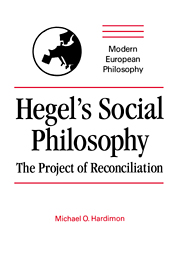Introduction
Published online by Cambridge University Press: 10 December 2009
Summary
The central aim of Hegel's social philosophy was to reconcile his contemporaries to the modern social world. Hegel sought to enable the people of the nineteenth century to overcome their alienation from the central social institutions – the family, civil society, and the state – and to come to ‘be at home’ within them. ‘The project of reconciliation’ is the name I have given to this enterprise. My aim in this book is to explain what the project of reconciliation is.
Hegel's project merits close examination for at least three sorts of reasons. The first has to do with our own cultural concerns – concerns that might equally well be classified as ‘political’ or ‘personal.’ Our social world – the present-day social world of Europe and North America – is a world of alienation (Entfremdung). It characteristically gives rise to the felt experience of alienation. Many people feel ‘split’ from its institutions, regarding them as foreign, bifurcating, and hostile or indifferent to their needs. Many people also feel split within themselves, divided by the conflicting aims of realizing their individuality and being members of the community. Not everybody feels this way, of course, but many do. A felt sense of division and conflict is a pervasive feature of our world. Alienation is a problem for all of us in the sense that it is a problem of our culture. Not the least reason for looking at the project of reconciliation, then, is that it addresses a problem that is – or ought to be – of concern to us.
- Type
- Chapter
- Information
- Hegel's Social PhilosophyThe Project of Reconciliation, pp. 1 - 12Publisher: Cambridge University PressPrint publication year: 1994



